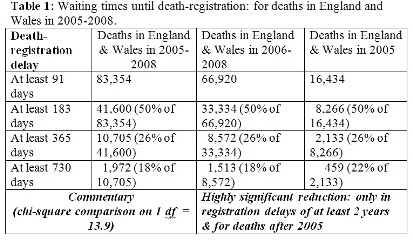Progress in reducing death registration delays, but more is needed
Further and better particulars about the number and length of the delays in certifying deaths in England and Wales have come from parliamentary questions asked by Patrick Mercer MP.
Straight Statistics has drawn attention more than once to such delays and the difficulties they pose to researchers. The Royal Statistical Society has issued a supporting policy statement on the need for legislation to outlaw such long delays in the registration of coroner-referred deaths in England and Wales, which concludes: “The Royal Statistical Society therefore reaffirms its belief, as set out in its response to the Science and Technology Select Committee’s Inquiry into Scientific Advice in Emergencies, that in England and Wales deaths referred to coroners should be registered in an appropriately timely manner as in Scotland.”
The answers to Mr Mercer’s questions confirm that almost all (99 per cent) of the 10,705 deaths in England and Wales in 2005-2008 for whom registration delay was 365 days or longer were deaths that had been subject to inquest.
Of 2,003,714 deaths in England and Wales in that period, 442,292 were referred to coroners, and 113,469 in all (5.6 per cent) were subject to inquest. Table 1 gives a fuller account of the registration-delay distribution than was previously available: for over 83,354 deaths, and so about 19 per cent of deaths referred to coroners, the registration delay was at least 91 days (3 months). For half of these deaths the delay was actually at least 183 days. For 10,705 of these 41,600 deaths, the registration delay was at least one year and for 1,970 deaths the delay was two years or more.
The data shows that delays were less for deaths in England and Wales in 2006-2008 than for those occurring in 2005. Tentatively, I’ll refer to this as the “Mercer effect” in recognition of the notable, and notably successful, parliamentary work by Mr Mercer, aimed at reducing excessive waiting times for verdicts in military inquests. From October 2007, additional funding was made available by the Labour Government as a result of his interventions and may have contributed to collateral gains in reducing excessive waits for other inquest-verdicts. Of course, there may be other explanations too . . .




